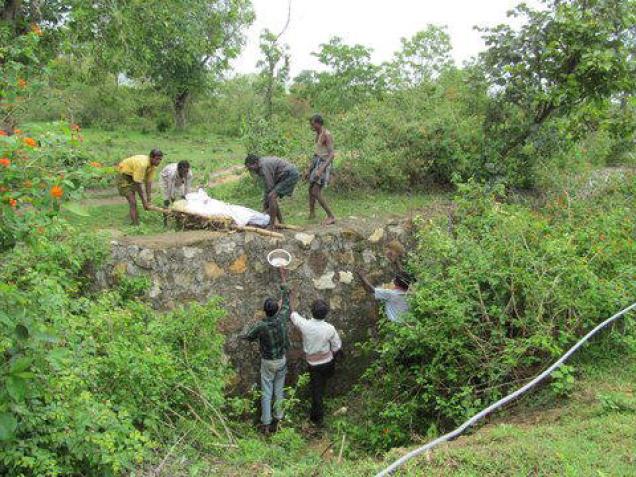 BANGALORE, June 24;Gouri (55) of Hunusekuppe Haadi (tribal hamlet) in H.D. Kote taluk of Mysore district died of illness recently. Her husband K. Raju, an agricultural labourer in Madikeri, rushed to the hamlet on hearing the news.
BANGALORE, June 24;Gouri (55) of Hunusekuppe Haadi (tribal hamlet) in H.D. Kote taluk of Mysore district died of illness recently. Her husband K. Raju, an agricultural labourer in Madikeri, rushed to the hamlet on hearing the news.
Though arrangements were in place to cremate her, the bereaved family could not do so for three days. The family claimed that the Department of Forests refused to disconnect power supply to the solar fence between the hamlet and the burial ground inside the forest. This resulted in the delay.
When appeals by the haadi residents failed, they smeared slat on Gouri’s body to avoid decomposition. It was only after the intervention of the tahsildar that the power supply was disconnected and Gouri cremated.
The ‘Jamma’ cremation ground which belongs to Hunusekuppe Haadi is inside the forest. But, a trench and solar fencing erected by the department are preventing tribal people from entering the forest for legitimate purposes, including cremating the dead. Some six months ago, tribal people in Dasanapura Haadi in Hunsur taluk faced a similar problem as they were unable to access their burial ground.
Gouri’s family attributes the situation to the inordinate delay by the State government in granting community rights.
The Scheduled Tribes and Other Traditional Forest Dwellers Act, 2006 has accorded tribal people the right to forest dwelling, collect minor forest produce and use grazing ground, cremation ground and water bodies.
There are over 1,300 tribal settlements in 32 taluks of nine districts in Karnataka. According to M. Shivaswamy, Director of Tribal Welfare, of the 2,886 applications received from tribal settlements in Mysore, Shimoga, Chamarajanagar, Chikmagalur, Uttara Kannada, Kodagu, Dakshina Kannada, Mandya, Udupi and Ramanagaram districts, only 90 hamlets have been sanctioned community rights. While 595 applications are pending, the remaining 2,201 have been rejected.
The Act also provides tribal people the right to protect and manage the forest and conserve community forest resources. The National Advisory Council has proposed insertion of new rules to facilitate communities to access and enjoy these rights.
“Under these circumstances, how can the Directorate of Tribal Welfare reject the applications,” asks Srikanth, Development through Education (DEED).
“Till the community rights are sanctioned to all the 1,300 settlements, the Department of Forests has no authority to curtail the rights of tribal people over grazing ground and burial ground. If the Hunusekuppe Haadi people had got community rights, the problem would not have occurred,” said Nanjundaiah of Nisarga Foundation, which is fighting for tribal rights.
“A complaint has been filed by the Civil Rights Enforcement Cell, which is inquiring into the issue,” he said.
Similar is the situation in Chikmagalur, says Vitthal, State president of Dalit, Aadivasigala Bhoomiya Hakkigagi Aandolana. “None of the settlements in the district has got the community rights,” he said.
“Though applications seeking community rights have been approved by the gram sabha and sub-divisional committee and sent to the district-level committee, the Department of Forests is apathetic in finalising them,” said C. Made Gowda of the Zilla Budakattu Soligara Abhivruddhi Sangha.
